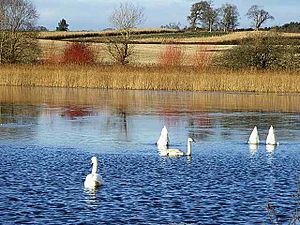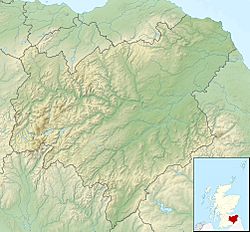Lake of the Hirsel facts for kids
Quick facts for kids Lake of the Hirsel |
|
|---|---|
 |
|
| Location | Scottish Borders, Scotland |
| Coordinates | 55°39′28″N 2°16′41″W / 55.65778°N 2.27806°W |
| Type | reservoir |
| Basin countries | United Kingdom |
| Surface area | 27 acres (11 ha) |
The Lake of the Hirsel (also known as Hirsel Lake) is a beautiful, man-made lake located near Coldstream in Berwickshire, Scotland. It is found within the lovely grounds of The Hirsel. This historic estate was once the home of the Home family. A very famous person who lived here was Alec Douglas-Home, who used to be the leader of the British government.
The lake is also a special place called a Site of Special Scientific Interest. This means it is protected because of its important wildlife or geology.
Contents
Discovering Hirsel Lake
Hirsel Lake is not a natural lake. It was created by people. It covers an area of about 27 acres (110,000 m2). To help you imagine its size, that's roughly the same as 20 football fields!
How Big is Hirsel Lake?
The lake is shaped a bit like a square. It measures about 300 to 400 metres across. This makes it a good size for enjoying nature and the peaceful surroundings.
What is a Site of Special Scientific Interest?
A Site of Special Scientific Interest (often called SSSI) is a special area in the United Kingdom. These places are chosen because they have important plants, animals, or geological features. Protecting them helps keep nature safe for everyone. Hirsel Lake is an SSSI because of its unique environment.
Lakes vs. Lochs in Scotland
Did you know that most large bodies of water in Scotland are called "loch" and not "lake"? Hirsel Lake is one of the very few exceptions!
Why is it Called a Lake?
Most large natural bodies of water in Scotland are known as lochs. Think of famous ones like Loch Ness! However, there are a few places that are called "lakes." Besides Hirsel Lake, these include the Lake of Menteith, Pressmennan Lake, Lake Louise, and Cally Lake. There is even a sea bay called Manxmans Lake. It's a bit of a mystery why these few are called "lakes" instead of "lochs."
 | Mary Eliza Mahoney |
 | Susie King Taylor |
 | Ida Gray |
 | Eliza Ann Grier |


